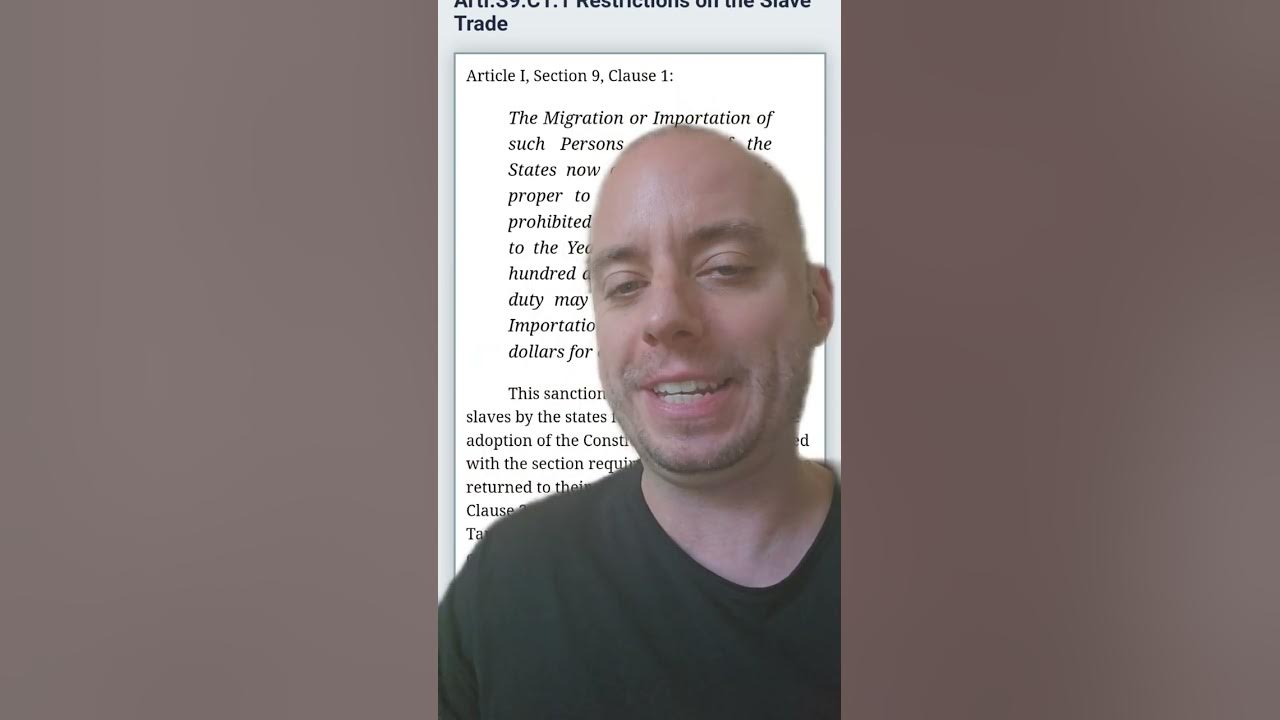(READ VIDEO DESCRIPTION) - Brandon Joe Williams INTERVIEW @ THE MENTAL MILITIA with Gary Mac
Summary
TLDRIn this enlightening video, the speaker delves into the complexities of legal frameworks surrounding citizenship and government manipulation, focusing on negotiable instruments, legal documents, and historical court cases. The speaker recounts personal experiences with mentors and document creation, discussing the evolution of their understanding, including the shift from advocating for non-citizen nationals to promoting state citizenship. Legal references such as 28 USC 1332, the Slaughterhouse Cases, and the Dred Scott decision are analyzed, exploring how the definitions of 'citizen' and 'person' have evolved, particularly with the 14th Amendment and its implications on racial distinctions in the United States.
Takeaways
- 😀 The speaker argues that U.S. citizens have only one fundamental right: not to be deported, with all other rights being conditional or non-existent.
- 😀 The Dred Scott v. Sanford case (1857) is cited as a key moment in U.S. legal history, where African Americans, free or enslaved, were denied citizenship and rights.
- 😀 According to the Dred Scott case, Black people were considered inferior and unfit for political and social rights, an opinion based on European colonial and slavery history.
- 😀 The speaker critiques the widespread assumption that U.S. citizens have inalienable rights, arguing that many rights are contingent on the government's recognition and permission.
- 😀 The U.S. legal system, according to the speaker, has built-in exclusions for certain groups, particularly African Americans, as seen in legal precedents like Dred Scott.
- 😀 The term 'people' is argued to be absent in U.S. legal codes before 1873, indicating that laws did not consider Black people as full citizens.
- 😀 The speaker emphasizes the systemic nature of racial discrimination in U.S. law, which can be traced back to foundational legal cases like Dred Scott.
- 😀 The Dred Scott case not only focused on race but also explored the complexities of slavery laws, including the movement of slaves between states and territories.
- 😀 The speaker suggests that the Dred Scott case represents a clear example of institutionalized racism that continues to influence American legal and social systems.
- 😀 The conversation challenges modern interpretations of 'sovereign citizens' and critiques the mainstream narratives around rights and citizenship in the U.S.
Q & A
What is the only absolute right that a U.S. citizen has, according to the speaker?
-The only absolute right a U.S. citizen has is not to be deported, meaning they cannot be forcibly removed from the country as a citizen.
What rights are the speaker claiming U.S. citizens do not have?
-The speaker claims that U.S. citizens do not have the rights to pursue happiness, own property, bear arms, free speech, rent a home, or even walk down the street.
What legal case is referenced to discuss the treatment of Black people in the United States?
-The Dred Scott v. Sanford case of 1857 is referenced, where the court ruled that Black people, whether enslaved or free, were not considered part of 'the people' the Constitution was meant to protect.
How does the speaker interpret the Dred Scott decision in relation to Black people's status?
-The speaker interprets the Dred Scott decision as legally affirming that Black people were seen as inferior beings who had no rights that a white man was bound to respect.
What does the speaker say about the use of the word 'people' in U.S. law?
-The speaker claims that the word 'people' is absent from the U.S. code from the beginning to the end, implying that legal language has systematically excluded Black people from the protections afforded to 'the people.'
What historical context does the Dred Scott case consider in its ruling?
-The Dred Scott case considers the history of slavery in the U.S., reviewing cultural, state, and local laws concerning Black people, mulattos, and slaves, as well as looking back to English and European legal systems.
How does the speaker view the relationship between legal decisions and societal norms?
-The speaker believes that legal decisions like Dred Scott reflect deeply ingrained societal and cultural views, particularly the widespread belief in the racial inferiority of Black people at the time.
What does the speaker imply about the possibility of changing these deeply ingrained views in society?
-The speaker suggests that even if the court wanted to change its stance, the overwhelming cultural and historical evidence supporting racial inequality made it nearly impossible to do so.
How does the speaker view the concept of 'systemic racism' in relation to the Dred Scott case?
-The speaker argues that the Dred Scott case is an example of systemic racism, as it reflects centuries of legal and cultural treatment of Black people as inferior and unworthy of rights.
What is the speaker's opinion on the idea of 'sovereign citizens'?
-The speaker acknowledges the term 'sovereign citizens' and makes light of it, suggesting that it is a concept some people use to assert their freedom from government control, but in the context of legal history, it is linked to the broader issue of citizenship and rights.
Outlines

This section is available to paid users only. Please upgrade to access this part.
Upgrade NowMindmap

This section is available to paid users only. Please upgrade to access this part.
Upgrade NowKeywords

This section is available to paid users only. Please upgrade to access this part.
Upgrade NowHighlights

This section is available to paid users only. Please upgrade to access this part.
Upgrade NowTranscripts

This section is available to paid users only. Please upgrade to access this part.
Upgrade NowBrowse More Related Video

Subjek Hukum Internasional - Multinationals Corporations

Business Regulatory Framework: Module 3.1

Administration of justice in Madras before 1726?

How to Never Pay Taxes Again (In Ten Minutes)! v2.0

DASAR HUKUM PENGURUS UNIT USAHA MENJABAT DI YAYASAN - DR. MUHAMMAD REZA SYARIFFUDIN ZAKI, S.H., MA

Legal, law officials warn of growing popularity of sovereign citizen movement
5.0 / 5 (0 votes)